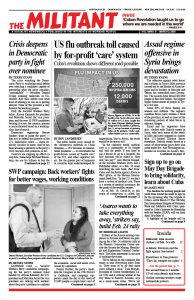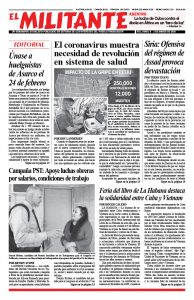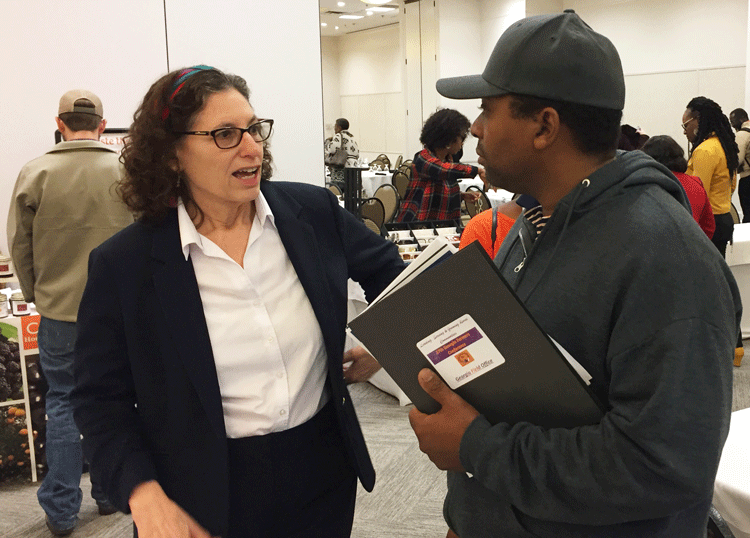ALBANY, Ga. — One of the largest workshops at the Federation of Southern Cooperatives 37th annual conference here Feb. 13-14 discussed the challenges Black farmers face in keeping land they inherited from parents or grandparents who had not left wills deeding the farms to their children. Under the Jim Crow racial segregation of those times, Black farmers faced serious difficulties getting trusted attorneys to draft wills or just didn’t see any compelling need for it.
Rachele Fruit, Socialist Workers Party candidate for U.S. Senate from Georgia, attended the conference to learn more about what working farmers face and to introduce them to her campaign.
The federation was formed in a half-dozen southern states by African American farmers. It assists them in getting credit, legal help to retain ownership of their farms, technical training and other services. Many of the more than 200 conference participants — including both farmers, others who work with them or who want to become farmers — were attracted to the SWP platform, which calls for an alliance of workers and farmers in the face of today’s capitalist economic crisis.
“I’m glad I found you,” Ken Webb, 27, who grew up on a farm in Choctaw, Mississippi, told this worker-correspondent, who accompanied Fruit to the conference. Webb currently works on soil and water conservation projects. “My family has three farms growing soybeans, cotton and other crops.
“Many Black farmers are getting old and a lot of farms and land are being lost. We need to get more young people farming,” he said.
Manuel told Webb that the party is running Alyson Kennedy and Malcolm Jarrett for U.S. president and vice president. The party’s 2020 platform says that “to put a halt to farm foreclosures, bankruptcies and skyrocketing rural debt, we demand nationalization of the land.” The campaigners described how this was accomplished by workers and farmers in Cuba as part of their revolution.
Webb was interested in books that the SWP campaign promotes by and about Malcolm X and the Cuban Revolution. “When your presidential candidates are in town, just let me know,” he said.
Kevin Stanley, a 39-year-old Army veteran, was with a couple of friends who are also vets looking to start a farm. According to a 2017 Department of Agriculture census, 19% of Black farmers had served in the military. Stanley grows peanuts on his father’s farm.
Fruit asked Stanley what he thought about Iraq. “We should never have been there,” he said, “but I guess we have to finish what we started.”
“The Socialist Workers Party calls for the immediate, unconditional withdrawal of all U.S. troops from the Middle East, for an end to the sanctions against Iran,” Fruit said. She pointed to protests today by workers and young people in Iran and Iraq against Tehran’s wars in the Middle East and the effect on their lives.
“And ‘we’ didn’t start anything,” Fruit added. “There are two main and contending classes. The capitalist rulers send us as cannon fodder to the Middle East to protect their markets and access to oil. It’s in our class interests — and those of the toilers in that region — to get out and turn our attention to meeting the attacks of the bosses and bankers here.”
“We need younger faces in office to think outside the box,” Stanley said.
Fruit, a Walmart worker, noted that her opponent, Sen. David Purdue, who is up for reelection, is from a prominent agri-business family in Georgia and is a former CEO of Dollar General stores. Working people need their own party, a labor party, Fruit said.
“The issue isn’t young or Black or female faces,” said Fruit. “It’s a class question. What matters is whose interests you represent and which class holds power.”
“You’re right,” Stanley agreed.


